Equality Now releases the trailer of Asia’s first fiction film on FGM/C, directed by Sahiyo co-founder, Insia Dariwala
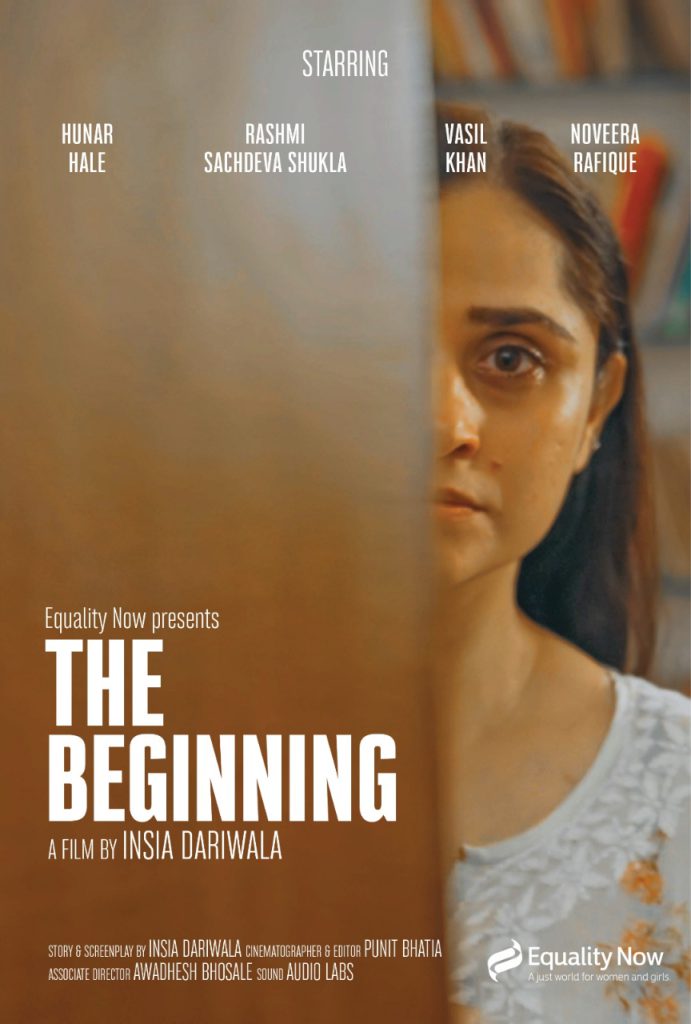
On International Day of Zero Tolerance for Female Genital Mutilation, Equality Now — an NGO that advocates for the rights and protection of women and girls around the world — released the trailer for “The Beginning.” Written and directed by Sahiyo’s co-founder Insia Dariwala, it’s the Asian continent’s first ever fiction film on Female Genital Mutilation/ Cutting (FGM/C). Inspired by real survivors who underwent FGM/C as little girls, the film highlights the trauma many struggled with, long after the cut. Equality Now’s Global Leader, Divya Srinivasan, who worked with Insia on producing the film said, “We believe that this thought-provoking piece evocatively demonstrates the struggles faced by a woman holding the dual experiences of being a survivor herself, while also being a mother who is expected to play a major role in continuing the practice with future generations.” She also writes, “Since survivors of FGM/C in India broke the silence about this practice over seven years ago, there have been great strides towards prevention and eradication of FGM/C. The issue of FGM/C in India has been recognised in the Supreme Court and at international bodies; and there is greater awareness on the patriarchal nature and harmful effects of the practice within practicing communities, particularly amongst the younger generation. However, we have a long way to go in the struggle to end FGM/C and we need more public conversations to change hearts and minds of all stakeholders, and prevention and response initiatives to ensure that we can move towards the goal of eradication.In partnership with Insia and Sahiyo, we hope that we can use this film to raise awareness on FGM/C in the country, particularly with young people; and to highlight FGM/C as a priority human rights issue that needs to be addressed by a range of stakeholders including the international community, medical associations, and CSOs working on ending gender-based violence in India.”
Bearing Tradition: Navigating the Pressure of Khatna
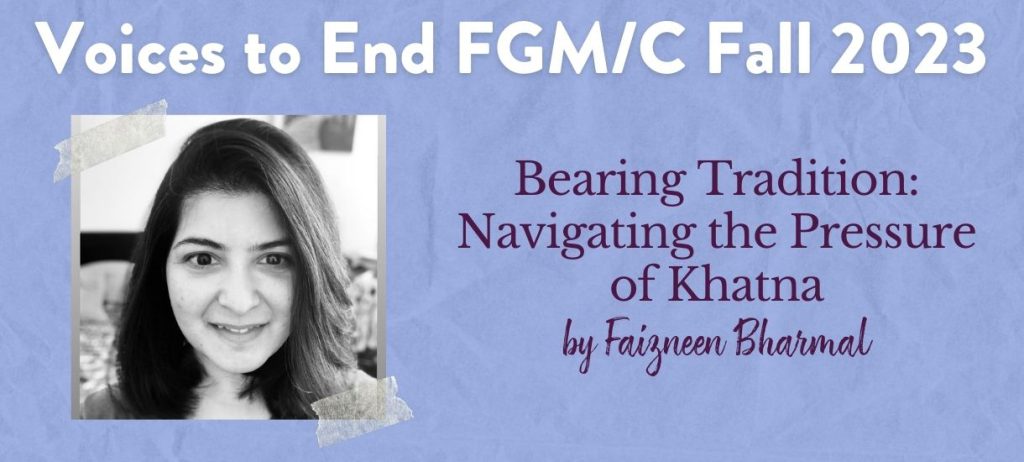
By Faizneen Bharmal Growing up in a progressive and well-educated Dawoodi Bohra family, the topic of Khatna, commonly known as female genital mutilation/cutting (FGM/C) around the world, was always shrouded in silence. The subject was rarely broached unless one became a parent, at which point it became relevant. For the majority of my life, I remained oblivious to its existence. Within the Dawoodi Bohra community, FGM/C Type 1 is predominantly practiced. In the majority of cases, this involves part of the prepuce or the clitoral hood being cut. I’ve often heard rationalizations for the practice, from women in my community: “We only remove a tiny, inconsequential part. Most girls hardly even notice it.” “It’s done under the supervision of a medical practitioner, ensuring hygiene and safety.” However, my story and experience prompts me to pose some critical questions to those who persist in this harmful practice. Does the severity of trauma a child endures become acceptable just because it involves removing a tiny part? A child who can remember when the act was performed on them? Are you so resolute in your beliefs that you’re willing to deprive your child of what they rightfully deserve? Does your religious duty and the societal pressure of community membership outweigh the lifelong trauma that a child must endure? For far too long, Khatna, as it’s referred to in the Bohra community, remained a closely guarded secret—a taboo subject that was never up for discussion. What perplexes me is that it contradicts everything I know about my community: A community that prides itself on being educated, forward-thinking, and modern. My story isn’t merely about the personal trauma I endured, but also about the immense pressure the community exerts on each generation to uphold this tradition. A tradition, it seems, is a beast that’s not easily slain, even if it causes them to sacrifice the well-being of young girls. When I made the decision to share my story, I engaged in a profound conversation with my mother. I’m grateful that she understood my perspective and is willing to support me in my mission to educate women of her generation and those younger so that the burden of this practice is not passed down to their daughters and daughters-in-law. [youtube url=”https://www.youtube.com/watch?v=a8rNekCvjc4″] Faizneen is a communications professional with 12+ years of experience working to inspire action and meaningful engagement via content creation, storytelling, and media in humanitarian crises situations, rural transformation, public health, human rights, women’s rights, literacy, and poverty alleviation.
A daughter’s khatna, a father’s regret: A poem in Hindi
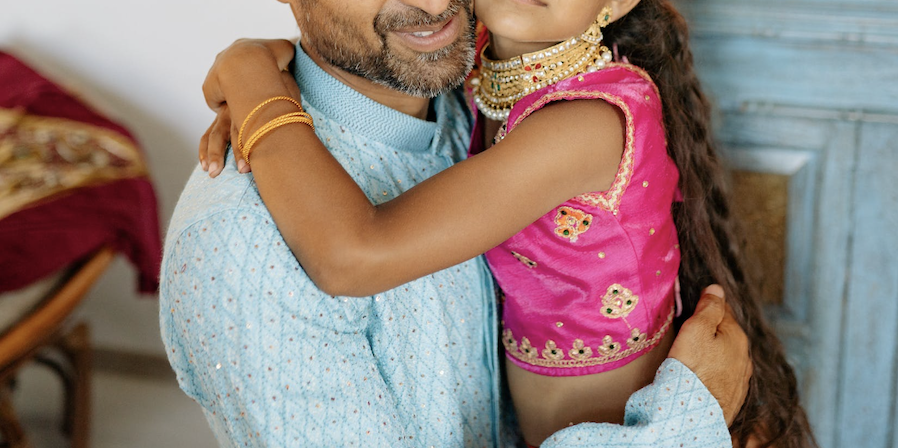
by Abbas Ali Bohari This is a heartfelt poem about a Bohra father’s greatest regret. The poet, who hails from Indore, India, spent years praying for the birth of a child and was finally blessed with a daughter. A few years later, he found out that she had been subjected to khatna, or female genital cutting, behind his back. This is a poem about his grief for her, his regret, and his plea to the world to end the cutting of girls in the name of religion. एक पिता का अफ़सोस कई बरसों रहे दोनों बेकरार रहमान ने लगाया बेड़ा पार बुजुर्गों की दुआओं का भी असर गुड़िया रानी आयी हमारे घर रौशन कर दिया हमारा संसार लायी खुशियों की सौगात अपार अब ना करू किसी की दरकार मालिक बस तेरा ही शुक्रगुज़ार हँसते हँसाते गए बरस गुजर एक दिन ऐसा आया खूंखार मज़हब के नाम पर मचाया अंधेर मासूम के जिस्म को किया दागदार कसम ख़ुदा की मैं नही ख़तावार पीठ पीछे किया सारा अत्याचार कही नही मिली दींन में तफ़सीर हैरां हूं कब से शुरू हुआ ये फ़ितूर शरीयत का अंग बताते ज़ाहील ज़ोकर पर मुख़ालिफ़त करते इल्मी ज़ानकार मगरिबी तहज़ीब करे इंकार मशरीकी कौमे बैठी लाचार खत्म करो नाजायज़ विचार सज़ा पाये सारे जो है हक़दार *अब्बास* करे अफ़सोस बारबार बचा ना पाया अपना लख्तेज़िगर
Session on FGM at the workshop Nayi Dishayein- Rethinking Development
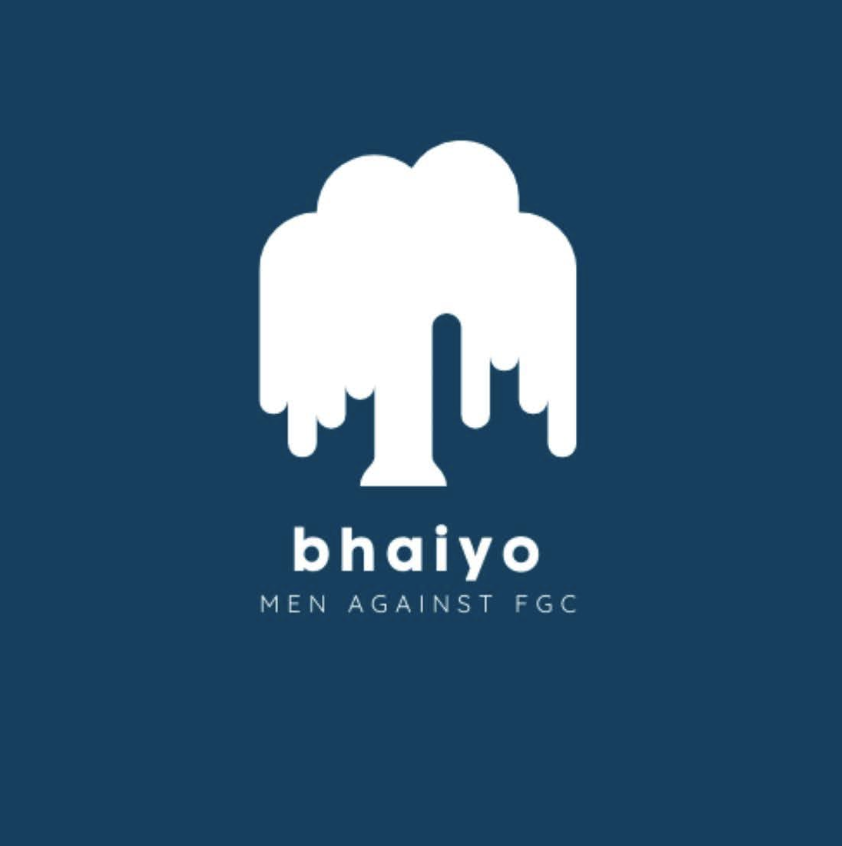
By Mohammad Chappalwala Gender-based violence takes many forms. One of the most extreme, I think, is female genital cutting/mutilation (FGM/C), which causes harm to the youngest and most vulnerable members of our society. Being a male member of a community that practices this, I believe it is my responsibility to spread awareness regarding this harm that is often done to seek control of the sexuality of women. On 26th December, 2022, Sambhaavnaa Institute of Public Policy and Politics incorporated FGM/C into its Nayi Dishayein workshop, a 12-day course educating youth from across India on a wide range of issues, from development and the confines of patriarchy to environmental conservation and sustainable living. We, along with our participants, challenged our beliefs, views, convictions, and privilege resulting from the enduring power structures that stem from the social markers of caste, gender, religion, and class; and how they are linked with the notion(s) of development. We began with a brief introduction to the practice of FGM/C, and discussed the different types practiced within different communities around the world. We looked at this form of gender-based violence through the lens of patriarchy, and examined how patriarchy enables gender violence, controls the sexuality of women and other genders, and expects conformity. After this, we issued a trigger warning and screened the movie, A Pinch of Skin for our participants. The film was followed by a short presentation detailing the practice of FGM/C and its categorization as a human rights violation by the World Health Organization. I find the fact that male members of my community are either unaware of FGM/C, or choose to stay away from the cutting of their loved ones, to be deeply unsettling. My community is the Dawoodi Bohra community, where this practice is exercised discreetly – nobody talks about it. Usually, the mother and grandmother of the child decide to take her to a local practitioner, who gets the job done. Often these practitioners are not even medically trained. In 2019, my team and I had the opportunity to attend Sahiyo’s FGM/C retreat and learn from Dr. Sheroo Zamindar, an obstetrician-gynecologist from Ahmedabad. With this knowledge base and our own learning, we were able to educate participants of this recent session on FGM/C, which is what we believe to be a crucial part of any discussion chronicling gender-based violence. This February 6th, International Day of Zero Tolerance for FGM/C, we, as male allies, must wholeheartedly commit to becoming pioneers in the conversation to end this practice and protect those we love. Mohammad Chappalwala is an autodidact environmentalist who left his corporate job and the hustle of the city to live in the mountains and work for the community. He is passionate about contributing to social movements that deal with the fundamental rights of the people, and strongly believes in the work of Sahiyo; he likes to provide complete support to stop FGM/C as a Bhaiyo, or male ally. He is a programs convener at Sambhaavnaa Institute of Public Policy and Politics, Himachal Pradesh.
My first encounter of female genital cutting

Trigger warning: Below is one person’s account of her experience with female genital mutilation in India. This story may be disturbing and/or triggering for some. We thank her for being brave and sharing her story with us. By Anonymous “Sit here..here on this steel plate. [Takes out a pair of sharp scissors]. Shh! Just close your eyes…[Removes my underwear]. Nothing will happen, darling! [My mother holds my hand]. It’s done…[She covered my mouth]. It’s almost done. [I was bleeding]. Don’t cry…Good girls don’t cry! [Because good girls…they…they get circumcised]. The events of my circumcision, or female genital cutting (FGC), continue to be a source of haunting noise to my listening ear. My 7-year-old self only thought of a promised chocolate treat, given to compensate for that deadly pain; how her Maa would kiss her cheek for being a brave girl sitting on that steel plate. She did not know she was sitting in that shadowy hideous place to pay for her sin: the sin of being a woman. When you are as young as 7, you are not aware of the moral conscience. You do not pay attention to the right or wrong of things, and keep doing as you are told. When puberty hits, you start becoming more aware about yourself and questioning things being right or wrong. At 14, I became mature enough to understand what happened to me when I was 7; I was able to identify it as FGC. The practice is followed by many communities across the globe. Some communities dictate FGC as a mandatory thing for the women to undergo through their religious leader’s sermons. It is believed that the cutting or removal of total or partial genitalia will give the men complete satisfaction and comparatively more pleasure while indulging in sexual intercourse. People in these communities believe it is obligatory for the women of the family to go through FGC for social acceptance. There is no reference to FGC in the Qura’an or any other holy books. It is completely driven by societal norms. I am angered that these societies feel it is ethical to control how a woman should be through her genitals, so that she may be accepted within the community. As a teenage girl who has realized what has been done to me, the fire within me to destroy the ritual from this world rages, because I care too much for the young girls who still keep getting bribed for a chocolate at the cost of their clitoris removal. FGC can have haunting effects on survivors’ physical and psychological health. Women whose total or partial clitoris have been removed are prone to a variety of infections in addition to excessive pain and bleeding. They may not experience intense pleasure during sex. It can severely affect mental health as well, resulting in anxiety and post traumatic stress disorder. FGC can make a survivor feel fragile and weaker in their societal position; it can make them insecure about their body. Personally, I don’t feel confident enough to open up about being a victim of FGC without sharing this story anonymously. I don’t want people to pity me because those who are to blame do not realise their faults yet. I think FGC is a worthy reason for not feeling obligated to follow the rules my community puts before me, including ways of dressing appropriately or maintaining my community’s integrity. As I see it, I chose to use ‘FGC’ over female genital mutilation (FGM) because mutilation means harming a person on purpose. I believe if my parents were aware enough about the practice being so much more than ‘in the name of God’, they wouldn’t have made me go through it. Personally, I don’t think laws would make a heavy impact on ending this practice because there are people who will conduct it illegally with unhygienic instruments even when India has banned the practice. To end FGC, it has to come as a revolution, the obliteration of an age-old, traditional ritual. Only when we ALL decide to make a change, can the world be saved. In the name of God, people perform such rituals, which makes these lines from Deaf Republic more and more sensible – “At the trial of God, we will ask- why did you allow all this?” The answer will be an echo- why did you allow all this?”
Female Genital Mutilation/Cutting (FGM/C): A survey of knowledge, attitudes, and practices of health care professionals in urban/ rural India

Female genital mutilation/cutting (FGM/C) has been performed on an estimated 200 million women and girls worldwide. Health care professionals play a significant role in the prevention of FGM/C. They can support and educate patients and communities about the advantages of ending the practice. However, health care professionals (HCPs) frequently lack the resources and education required to carry out these crucial duties. Until February 28th, 2023, a team of researchers from India is conducting a survey among health care professionals regarding their knowledge, attitudes, and practices (KAP) about FGM/C. Who is this survey for? Doctors (MBBS or postgraduate including AYUSH), nurses, and midwives practicing in urban/rural India. Our goals for this survey: to assess the KAP of health care providers; to establish a baseline for further research in India; to help facilitate the creation of efficient plans, policies, and targeted training initiatives on how to deal with FGM survivors (medically and psychologically) in the future for HCPs; to create awareness among health care workers in India. Any health care professional who is eligible according to the criteria can provide their insights about FGM/C by filling out this survey. It consists of roughly 30 questions which should take approximately 5 minutes to complete. Who can you reach out to? If you have any queries, feel free to contact the researchers at: alifya104@gmail.com or saadkazi5484@gmail.com.
Why are Indian ethics committees still hesitant to approve studies on FGM/C?
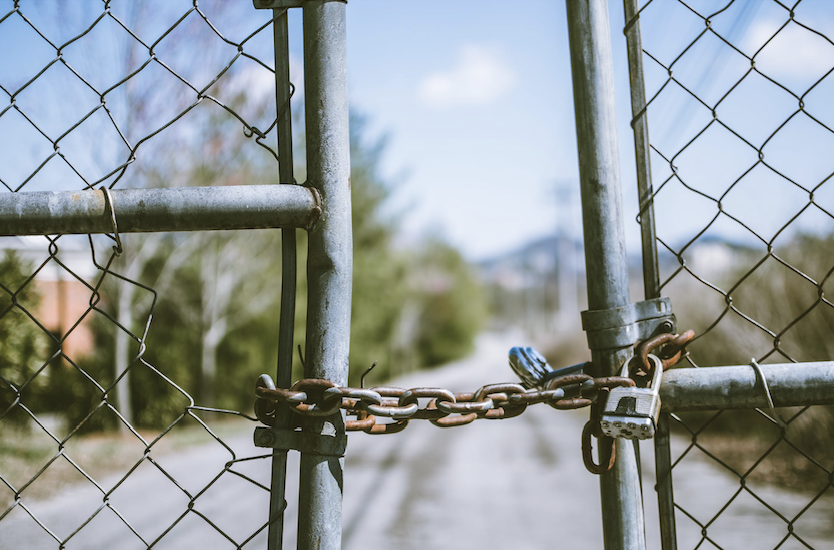
By Dr. Alifya In the past year, while making arduous efforts to obtain ethical approval for my research, I have come to understand the answer I was continuously receiving. “No.” My colleague and I, both doctors, sought out to survey Indian healthcare workers on their knowledge, attitudes, and practices about female genital mutilation or cutting (FGM/C). This simple cross-sectional study involved a questionnaire being sent out to Indian healthcare professionals via Google forms. It did not involve speaking to FGM/C survivors or providing any type of intervention; it simply served as a survey-based study to understand what Indian healthcare workers already knew or didn’t know about FGM/C. However, in trying to obtain ethical approval, we encountered unanticipated challenges. Being a healthcare worker and a survivor of FGM/C, I was searching for ways I could contribute to ending this practice. In our curriculum, there was not even a single mention of FGM/C. If a healthcare practitioner is unaware about the problem, how can they treat and assist? Healthcare professionals play a significant role in the prevention of FGM/C and can support and educate patients and communities about the advantages of ending the practice. Since very little research has been done in India on this topic thus far, I believed this would be a good starting point to pave the way for more research on FGM/C. Data from this research would also help create further awareness among healthcare workers. My colleague and I enthusiastically approached my father’s acquaintance, a gynecologist, with this idea. However, he attempted to dissuade us instead of guiding us. He claimed no one would discuss this subject; “Why not try something less contentious and simple?” Though discouraged, we weren’t prepared to give up. Next, we approached several committees in Mumbai for ethical clearance, including the ethics committee of our respective places of employment. However, no one responded. We eventually changed our jobs and approached these new institutes as well. Unfortunately, we got a similar response. “The topic is too sensitive. Try something simple.” Our research which started in Mumbai turned out to be extremely challenging. We met many people who loved the idea and were ready to guide us and be a participant in the research. However, they were not ready to publicly attach their or their institute’s name to it. After so many unsuccessful attempts, we decided to approach our parent institute, from where we graduated, in a small town in Maharashtra. Not many were aware of the practice. Despite this, we talked to our professors, and they were happy to assist us. The head of the ethics committee was eager to help us out as well, until she sat down and read our proposal. To our dismay, she echoed what we had been hearing for so long. “This topic is too sensitive. We cannot attach our institute’s name to it.” We have approached several committees over the past year and met with people who discouraged us, scared us, or pushed us into doing something else. But we are not giving up yet. We have emailed several independent committees all over India and are waiting for a response. Hopefully, someone will be able to help us. This journey has been challenging and difficult, but it has given us courage to keep finding new ways and not to give up. On our journey, we met a lot of new, encouraging, and supportive people. We are hopeful that some years down the line, the current situation will change. Becoming involved in this research and working to make changes has helped me emotionally deal with having had FGM/C. September 28, 2022 Update: I’m really happy to share the wonderful news that, finally, a Hyderabad-based independent committee has given its approval to our research. We found this independent committee through a business named Quinary Research Pvt Ltd. Though they had certain reservations, such as not including religion and naming Bohras as a practicing community, they were not as opposed to our research topic because we only included healthcare professionals and utilized a standardized World Health Organization (WHO) questionnaire. The fact that this independent committee lacked knowledge about the practice of FGM/C, and that it occured in India, is the major reason we believe they were willing to let us conduct the research; this lack of knowledge only goes to show how crucial conducting this study on healthcare providers’ knowledge on FGM/C is. We still have a lot of work ahead of us, but we have a start. Sahiyo has agreed to assist us with our project by providing funds and advice. We are grateful beyond words for Sahiyo’s unwavering support and encouragement in our work to end FGM/C.
Sahiyo India holds guest lecture for students in Mumbai

On March 5th, in the run up to International Women’s Day, Sahiyo India was invited to hold a guest lecture on female fenital cutting (FGC) for first-year students of Mumbai’s BMN Women’s College of Home Science; this screening was held in association with Muse Foundation. Sahiyo co-founder Aarefa Johari conducted the online session, which had over 50 student attendees. The session began with the screening of two short films from Sahiyo and StoryCentre’s Voices to End FGM/C series: Why by Fakhera, and A Chorus of Voices by Aarefa. The lecture then helped students understand what FGC is, why it is practiced, how it is harmful, and what can be done to end the practice. Aarefa also explored the concept of social norms and why they persist. Students were then invited to talk about the harmful social norms prevalent in their own cultures and homes, including menstrual taboos, which nearly every young woman in the class had experienced. This was the second time that Sahiyo India has given a guest lecture on FGC at the BMN College.
Sahiyo India to host a panel discussion on ‘How to Stop the Rising Trend of Medicalising Female Genital Cutting in Asia’

On January 20th at 4:30 IST, Sahiyo will host a webinar titled ‘How to Stop The Rising Trend of Medicalisation of Female Genital Cutting in Asia,’ featuring a panel discussion with medical experts and gender rights activists from India and Singapore who specialise in sexual and reproductive health. The medicalisation of female genital cutting (FGC) is an increasing issue in a number of Asian countries; a stark lack of legislation concerning the practice has contributed to a medical normalisation of FGC. Our panelists will explore medical perspectives about medicalisation and the current ethical debate surrounding this phenomenon, as well as touching upon the safety concerns and question of consent that underpins much of the controversy. Sahiyo is unwaveringly opposed to medical professionals performing FGC, as we believe it sets an alarming precedent of normalising the practice; we are keen to stress that there are no safe ways to cut a girl’s genitals, and therefore medicalisation is an important issue to address in the work against FGC. During this webinar, we will bring a diverse variety of voices to the panel to discuss the different elements of medicalising FGC, offering their own expert reasons for, and the dangers of, this increasing medicalisation. Our goal is to create a platform to explore the complexities of the shift towards the medicalisation of FGC across the world and to dispel the myth that it is a harmless way to perform the practice. In line with Sahiyo’s mission for women and girls to have autonomy over their body, standing firmly against the medicalization of FGC re-affirms a woman’s right to have control over her body and live her life free of harm. If you’re interested in joining our webinar, please see more information and sign up here.
End FGM – Save our daughters
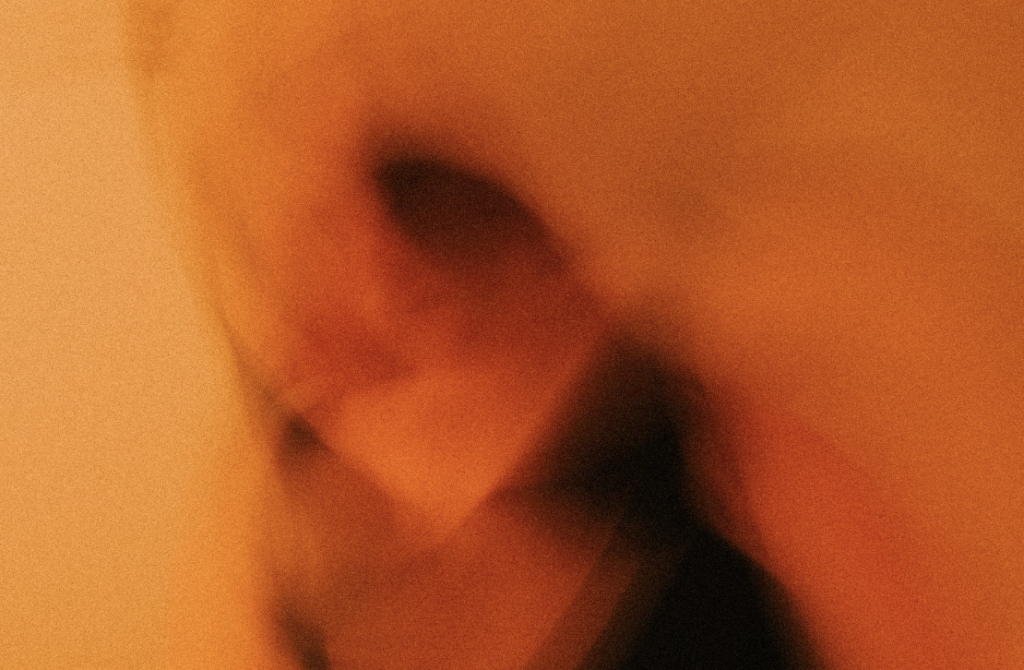
By: Arwa Country of Residence: India Today, I’m referring the most underrated topic ‘khatna’ or Female Genital Mutilation (FGM/C). I call it underrated because it doesn’t seem like educated persons in my society are talking about it even a little bit. It’s also called ‘Khafz’ in Islamic terms, and it’s a ritual in the Dawoodi Bohra community. Khatna usually takes place at the age of seven with girls. In the process of khatna, they cut the tip of the female sexual part ‘clitoris’ from the female genitalia with the use of a crude blade without giving any precautions. The purpose of doing that is to curb sexual desires. In some countries, it’s illegal, but India has no laws against khatna or FGM/C. The World Health Organization (WHO) considers it harmful for girls in many ways and has no health benefits. It includes damaging healthy tissues in females and causes trouble with the natural function of girls’ bodies. Many survivors have experienced pain, lifelong physical and psychological trauma. Some immediate complications include: Severe pain; Excessive bleeding; Vaginal infections; Wound healing problems; Shock; And in some cases death. Firstly, let me make this clear, I’m not against any religion but also do not support any religion in that way. What I mean is, I’m not against any religion but also I don’t have blind faith in it. I think there’s a major difference between beliefs and faith that our society needs to understand. I believe: If you do good, you will get good. I have read many articles on FGM/C. Community guidelines say ‘khafz take place for maintaining the taharat (pureness) and for spiritual purity.’ After reading it I felt like I would burn from inside, what has the world come down to. My heart was broken. Cutting out a human body part for spiritual purity; why would god give you something which makes you spiritually impure and then ask you to cut it off to become spiritually pure? I really don’t understand the logic behind FGM/C. What is the point of education that you are talking about? We are nurturing ourselves with modern education, reading about all atrocities going on in the world, when the same thing happens in our society; we are blind folded letting this happen. Many people have said that khatna is a good thing to do. It decreases sexual desires. So to that I ask, how do you know that a girl at age seven has sexual desires? Some had written in an article that it keeps the girl decent so girls won’t enter into adultery later, so on that I’m asking, where is the evidence of that? If we want our daughters to be pure, let’s teach them that they are strong and powerful women. They are in control of their own minds and bodies and they can use them wisely. When she was born, you promised to protect her. At the age of seven, they trust their family and parents the most. Parents tell them not to interact with strangers or not to let anyone touch you in your private areas, still it’s the family who takes them for khatna and allows strangers to touch and cut their girl’s clitoris. Why do something terrible to your girl which can leave scars on a mental level? People have to change their minds about old rules and regulations which they follow in the name of ‘tradition’. Families have a big role in ending FGM/C or khafz. Protect our girls. Our girls matter! I want to say a few things. I’m talking about this not for the sake of talking but for contributing to the voice that the Islamic religion (Bohra) seems to be avoiding. They have been avoiding it for years, but you can make sure they don’t avoid contributing by talking about this. Social media, I honestly believe, is one of the most powerful platforms. Otherwise also suppose- You are a teacher – you can probably discuss with your institution at the next assembly you can talk to your students about this. If you are in company you can hold a meeting in your office and talk about child abuse. Talk about this issue a little bit and tell people they need to speak up too. Maybe you can organise an activity or webinar regarding this issue. Whatever is in your capacity or power, do it please. It’s a harmful and outdated practice that needs to stop. Use your voice. It will definitely take time to go away but it doesn’t mean we keep sitting quietly. They are survivors, not victims. I’m a modern feminist and Bohra girl. I’m not a victim, I’m a survivor. I almost sat quietly, i didn’t talk about it but then I realised I must and so must you. Time to step forward for our daughters. Protest, speak up, fight for your daughters and let’s hope that the world changes for the better.
